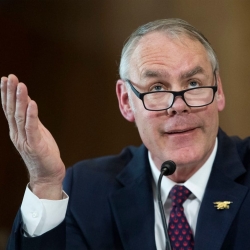
The grand jury is probing whether Zinke lied to federal investigators about his meetings with MGM Resorts lobbyists.
A federal grand jury is probing whether former U.S. Interior Secretary Ryan Zinke’s lied to federal investigators in a case involving a Connecticut casino. The question is whether Zinke lied to the Interior Department’s inspector general’s office about his motivations in blocking a casino the Mashantucket Pequot and Mohegan tribes planned to open in Connecticut, according to the Washington Post.
The IG’s office had been investigating whether Zinke was improperly swayed by lobbyists for MGM Resorts International, as well as politicians from Nevada — where MGM Resorts is headquartered. Had the two tribes been able to place a casino in the Hartford, Connecticut region, they would have been within 30 miles of the MGM Springfield, a $960 million casino in Springfield, Massachusetts.
The State of Connecticut, the Mashantucket Pequot Tribe, and the Mohegan Tribe are suing over the Interior Department’s Indian Affairs Bureau’s decision to block the Hartford-area casino in 2017. When asked about the grand jury probe, Interior spokeswoman Faith Vander Voort said, “The Department cannot comment on matters in litigation or investigation.”
Politico tried to reach Ryan Zinke, but he only told the reporter, “Have a great day, bye-bye.”
The Case of the Connecticut Casino
In 2011, the Commonwealth of Massachusetts authorized three licenses for land-based casinos. The MGM Springfield, which opened in August 2018, was the first of those casinos to open. MGM Resorts’ casino posed a threat to Connecticut’s two casinos, Mohegan Sun and Foxwoods, because they were twice as far from Hartford as the MGM Springfield.
To keep Connecticut residents instate, the state legislature approved a satellite casino in the Hartford area. The two tribes, longtime rivals, would operate the casino as a joint venture. They chose the Hartford suburb of East Windsor for the casino and drew up plans to open the resort on the site of an abandoned movie theater.
For the tribes to open a casino on non-tribal lands, they had to come to an agreement with the State of Connecticut and gain approval for the plan from the US Indian Affairs Bureau, a division of the Interior Department. When the state and tribes applied for approval, Ryan Zinke declined to answer their appeals for almost a year (by federal law, he had 90 days). When he answered, Zinke rejected the proposal.
Soon after, Connecticut and the two tribes brought a lawsuit against the Interior Department, claiming Zinke met with lobbyists from MGM Resorts International before making the decision. The grand jury probe is looking into whether Zinke lied to investigators about those meetings. If he did, it would be a felony.
Grand Jury Hearings into Ryan Zinke
Citing “two sources briefed on the matter”, prosecutors are presenting evidence related to the casino probe to a Washington DC grand jury. When Politico contacted the US Justice Department about the case, the DOJ declined to comment. A spokesman for the US Attorney’s Office in Washington DC also declined to comment.
Ryan Zinke, a former Navy Seal and US representative from Wyoming, had a tumultuous time in his 23 months as US Interior Secretary. The Interior Department’s inspector general, Mary Kendall, investigated several possible abuses by Zinke, including several conflict-of-interest cases.
IG’s Office Investigates Zinke
In late 2017, Mary Kendall sent a letter to Ryan Zinke discussing the ongoing investigations in senior leadership at the Department of the Interior — including Zinke himself. Kendall’s letter stated, “We have identified instances in which some D.O.I. employees, including senior officials, have engaged in unethical or illegal conduct.”
The probe had found several potential violations, including sexual harassment cases among the leadership of the National Parks Services. Kendall added that other violations included, “The acceptance of gifts from outside sources; conflicts of interest, including the use of public office for private gain; and the misuse of Government resources.”
Zinke Tried to Fire Inspector General
In October 2018, reports surfaced that Ryan Zinke sought to fire Mary Kendall in the midst of the investigations. She was to be replaced by Suzanne Israel Tufts, who held a position at the Department of Housing and Urban Development (HUD). When The Hill asked for confirmation, HUD confirmed Tufts was moving to the Interior Department to become inspector general.
Members of congress, government watchdogs, and environmental groups reacted with fury to the move. One said the move “stinks”, while another said it was “dangerous”. Michael Bromwich, a onetime inspector general at the US Department of Justice, tweeted: “Changing IGs in the midst of multiple serious investigations of the agency’s head should raise alarm bells everywhere.”
At the same time, Mary Kendall’s spokeswoman said they had received no word of her firing. Eventually, Interior Department spokespeople say Suzanne Israel Tufts had never been hired and Mary Kendall had not been fired. Despite Ryan Zinke being a known friend of HUD Secretary Dr. Ben Carson, Heather Swift, an advisor and spokeswoman for Zinke, said Ben Carson had “sent out an email that had 100 percent false information in it.”
A HUD official later told The Washington Post the mixup had been the result of “miscommunication at the staff level.”
Ryan Zinke Leaves Interior Department
By that time, Ryan Zinke’s support from President Donald Trump was starting to erode. Zinke’s alleged corruption had been overshadows for much of 2017 and 2018 by EPA Chief Scott Pruitt’s misconduct. When Scott Pruitt eventually resigned in July 2018, Zinke’s conduct began to attain more scrutiny.
After the November 2018 midterms, Donald Trump said he expected Zinke to leave his cabinet position in the near future. In December 2018, Zinke resigned as Interior Secretary.
In many cases, a resignation leads to the end of investigations into an administration official’s wrongdoing. That was not the case with Ryan Zinke, becuase the Justice Department had opened an investigation into his actions as a cabinet secretary by then.
